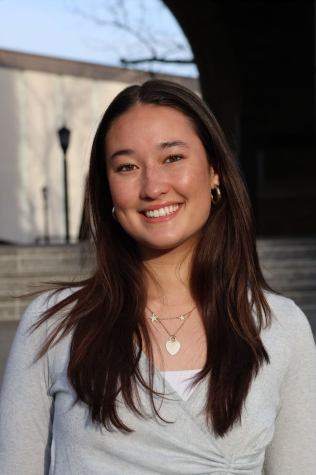Author Jose Antonio Vargas Visits Campus
October 5, 2022
“I don’t know where I’ll be when you read this,” Jose Antonio Vargas wrote in his opening sentence of his book, “Dear America: Notes of an Undocumented Citizen.” While he may not have known where he would be back in late 2017 when he was writing his book and preparing to leave the country, last Wednesday, he was at Villanova.
Villanova’s One Book Committee selected “Dear America” as the campus book for the 2022-23 academic year. It welcomed Vargas to campus to speak to students, professors and faculty on Wednesday, Sept. 28 in the Villanova Room as a part of its annual One Book Villanova Lecture during the St. Thomas of Villanova Celebration.
One Book Villanova is a campus-wide effort that presents a book to the University that sparks discussion and dialogue. The books engage the entire community and “allow us to explore our humanity, our ability to empathize with the sufferings of others, and our willingness to engage in hard truths about ourselves. The goal of One Book Villanova has always been to draw the Villanova community even more tightly together as we journey through the continuous adventure of a book.”
Vargas explained to the crowd how he least expected his book to be read in schools and never imagined his target audience to be students.
“I thought maybe Obama would read it and not like it,” he jokingly added. “But not people at school.”
Despite being the ultimate multi-hyphenate, Vargas is first a journalist, a story-teller. And oh, does he have a story to tell. When he was 12 years old, his mother sent him to live with his grandparents in California, so he left the Philippines, leaving everything and everyone that he knew behind. His first impression of America, he said, was “Macaulay Culkin’s masterpiece ‘Home Alone’ and the iconic ‘Thriller’ music video.” However, the real place was not the Hollywood-dream-world that he imagined from the Philippines. Vargas never realized that his citizenship and papers were fake until he attempted to receive his driving license at 16 and learned he was undocumented.
For a while growing up, Vargas hid his citizenship status, or lack thereof, and pursued his education, where he realized that journalism, a discipline that supported his inherent desire to question everything, could be a “way of writing [him]self into America.”
“Listening to Jose speak was powerful because even though I am technically an American citizen and do not share an identical experience, the way he spoke about feeling like you’re not actually an American struck a chord with me,” audience member Colette Jones said.
Jones is a native Hawaiian student at the University, and she described how as she grew up, she learned about Hawaiian history and the illegal annexation and stolen land that happened in the 19th century.
“Because we know what the US has done to Hawaii in the past, we can’t help but feel as though our American identity is fake,” Jones said. “A lot of us associate ourselves with being Hawaiian much more, and this questioning of how we fit into our country can be sensitive. However, living with so many minorities in Hawaii who understand this uncertainty feels like a privilege, and this is an experience that Jose never got to have. He is left questioning if he is American without feeling like he has a home.”
Vargas’ message also touched another listener, Ethan Lee.
“Both of my parents emigrated from Korea to build a new life for themselves in America, so our family was not kept together and we had to create a new one out of the community that we made as we started to put roots down,” Lee said. “I remember feeling alone sometimes, when other classmates would go visit their grandparents or extended family and mine were across the ocean.”
Vargas went on to write for The Washington Post, along with numerous other publications, and he received the Pulitzer Prize for his work covering the shootings at Virginia Tech. He also is an Emmy-nominated filmmaker, a Tony-nominated producer and the founder of the non-profit called Define American. He is one of Fortune’s “40 under 40” most influential people in government and politics and a TIME magazine cover star.
Throughout all of Vargas’ successes, he has remained passionately devoted to being a leading voice for immigrants and their rights. However, as he reminds the audience, his book is not just about immigration. It is a story, his story, of finding who you are and how you belong in the place where you end up. It is a story of creating a home where one never thought they would. Mostly, it’s a story of love, and this is why so many Villanovans who have lived vastly different lives will be able to relate and value this book.
His second book, “White Is Not a Country,” will be published by Knopf in 2023, and there will be a book discussion on “Dear America” on Tuesday, Oct. 25 at 1 p.m. in Falvey Library.


